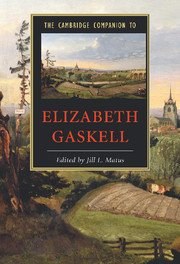Book contents
- Frontmatter
- 1 Introduction
- 2 The life and letters of E. C. Gaskell
- 3 Mary Barton and North and South
- 4 Cranford and Ruth
- 5 Elizabeth Gaskell’s The Life of Charlotte Brontë
- 6 Sylvia’s Lovers and other historical fiction
- 7 Cousin Phillis, Wives and Daughters, and modernity
- 8 Elizabeth Gaskell’s shorter pieces
- 9 Gaskell, gender, and the family
- 10 Elizabeth Gaskell and social transformation
- 11 Unitarian dissent
- 12 Gaskell then and now
- Guide to further reading
- Index
- Series List
2 - The life and letters of E. C. Gaskell
Published online by Cambridge University Press: 28 May 2007
- Frontmatter
- 1 Introduction
- 2 The life and letters of E. C. Gaskell
- 3 Mary Barton and North and South
- 4 Cranford and Ruth
- 5 Elizabeth Gaskell’s The Life of Charlotte Brontë
- 6 Sylvia’s Lovers and other historical fiction
- 7 Cousin Phillis, Wives and Daughters, and modernity
- 8 Elizabeth Gaskell’s shorter pieces
- 9 Gaskell, gender, and the family
- 10 Elizabeth Gaskell and social transformation
- 11 Unitarian dissent
- 12 Gaskell then and now
- Guide to further reading
- Index
- Series List
Summary
“I have always felt deeply annoyed at anyone, or any set of people who chose to consider that I had manifested the whole truth; I do not think it is possible to do this in any one work of fiction.”
(Elizabeth Gaskell to Lady Kay-Shuttleworth (?1850))Elizabeth Gaskell is a writer for whom generations of readers, critics, and scholars have felt an undisguised tenderness. “She will be herself remembered with affectionate regret by all who knew her,” stated Richard Monckton Milnes shortly after her death, “as a most genial and delightful lady, who gave light and comfort to her home and pleasure to every society she entered” (CH, 506). An unfeigned capacity for spontaneity, for sympathy, and for pleasure endeared her to her contemporaries; these same qualities have also powerfully influenced the tenor of historical reception of her work. Yet, for such a well-loved figure, Gaskell has also managed to excite an inordinate amount of controversy. We know that “Mrs. Gaskell” offended, even outraged critics with not one but several politically engaged works of fiction. She was threatened with libel suits by individuals angered over her handling of sensitive material in her role as biographer. Parishioners of her husband's congregation at Manchester's Cross Street Chapel actually burnt their copies of Ruth (1853), protesting against the perceived immorality of Gaskell's sympathetic portrayal of a “fallen woman.” And a small but determined band of reviewers took her to task at various points in her career for “the recklessness with which she has seized on a subject . . . which she has so misrepresented,” whether it be the condition of the working classes in Manchester or the causes of “the great social evil,” prostitution (CH, 124).
- Type
- Chapter
- Information
- The Cambridge Companion to Elizabeth Gaskell , pp. 10 - 26Publisher: Cambridge University PressPrint publication year: 2007
- 5
- Cited by



